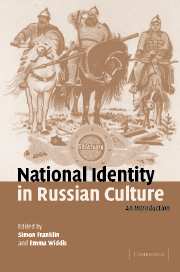Book contents
- Frontmatter
- Contents
- List of illustrations
- Notes on contributors
- Preface
- Note on the transliteration of Russian
- Map: The growth and contraction of Russia and its empire
- 1 ‘All the Russias …’?
- SECTION I IDENTITIES IN TIME AND SPACE
- SECTION II CONTRASTIVE IDENTITIES: ‘US’ AND ‘THEM’
- SECTION III ‘ESSENTIAL’ IDENTITIES
- 6 Identity and religion
- 7 Music of the soul?
- 8 Identity in language?
- 9 Byt: identity and everyday life
- SECTION IV SYMBOLS OF IDENTITY
- Afterword
- Notes
- Selected further reading in English
- Index
8 - Identity in language?
Published online by Cambridge University Press: 04 May 2010
- Frontmatter
- Contents
- List of illustrations
- Notes on contributors
- Preface
- Note on the transliteration of Russian
- Map: The growth and contraction of Russia and its empire
- 1 ‘All the Russias …’?
- SECTION I IDENTITIES IN TIME AND SPACE
- SECTION II CONTRASTIVE IDENTITIES: ‘US’ AND ‘THEM’
- SECTION III ‘ESSENTIAL’ IDENTITIES
- 6 Identity and religion
- 7 Music of the soul?
- 8 Identity in language?
- 9 Byt: identity and everyday life
- SECTION IV SYMBOLS OF IDENTITY
- Afterword
- Notes
- Selected further reading in English
- Index
Summary
APPROACHES TO IDENTITY IN LANGUAGE
Since the emergence of a Romantic philosophy of language at the beginning of the nineteenth century, theidea of a link between a nation's language and its self-consciousness and identity has been prominent in studies of cultural history. In Russian culture, the conflict between thetwo main approaches to the problem of ‘language and identity’ – they can loosely be called ‘nominalist’ and ‘realist’ – has played a significant role over the past two centuries. In the ‘nominalist’ view, language is a tool whose shape and development are contingent on the changing intellectual and cultural needs which it is supposed to serve. In the ‘realist’ view (approximating to an approach which elsewhere in this book is termed ‘essentialist’), the native language itself is the embodiment of its speakers' collective mentality and cultural tradition. Thus, according to the ‘nominalist’ view, the Russian literary language emerges and develops as a series of responses to specific cultural challenges and influences: from the adoption of Church Slavonic after the baptism of Rus in the late tenth century and its gradual assimilation by indigenous (East Slav) linguistic practices, through the adaptation of West European discourses and narrative techniques in the early and mid-nineteenth century, to the post-Soviet influx of Americanisms. According to the ‘realist’ (or ‘essentialist’, or perhaps ‘organicist’) view, language throughout its history, despite apparent changes, retains fundamental features that bear the imprint of national character.
- Type
- Chapter
- Information
- National Identity in Russian CultureAn Introduction, pp. 132 - 148Publisher: Cambridge University PressPrint publication year: 2004
- 4
- Cited by



